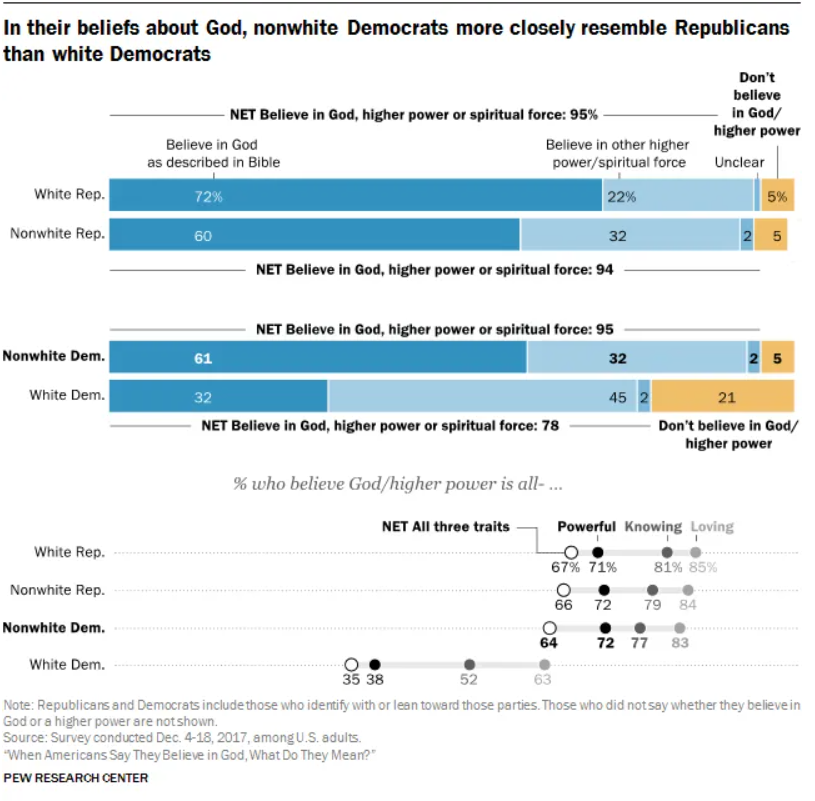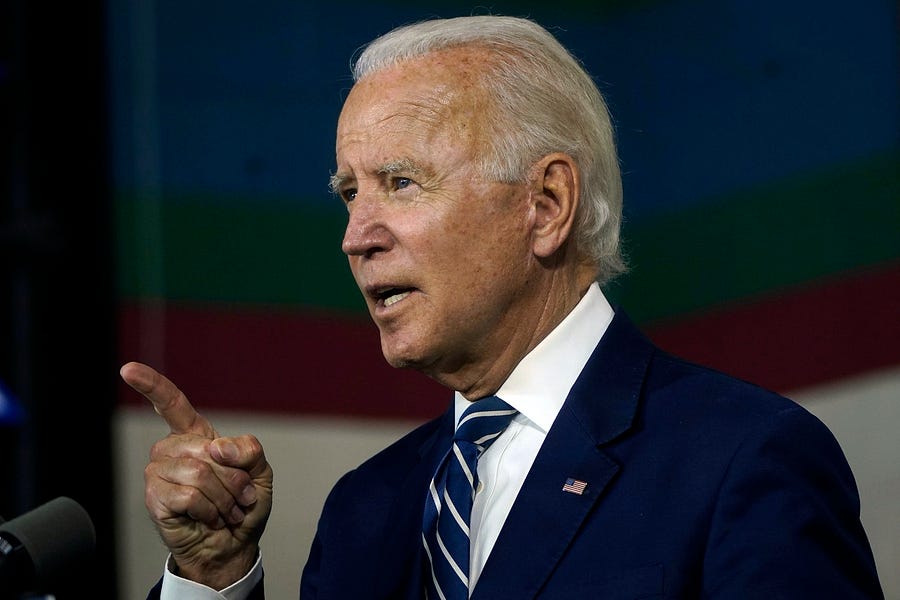When I was putting the finishing touches on my book, there’s one chapter I left on the cutting room floor. I now regret the edit. I spent page after page rebutting the idea that our present sharp political divisions are temporary because—to borrow the title of a famous recent book—the “emerging Democratic majority” will eventually swamp the GOP, destroy conservatism, and end the culture war.
Put simply, it’s a version of the argument that demography is destiny. The combination of more progressive younger voters and an increasingly diverse electorate meant that the future would (eventually) belong to the Democrats. And during the Obama era, at least, there seemed to be some solid evidence for the thesis. Then, the term wasn’t “emerging Democratic majority.” It was the “coalition of the ascendant.”
In my (deleted) chapter, I argued no. I argued that demography wasn’t destiny and that a combination of geography, demography, and religion would make Democratic domination elusive.
Joe Biden’s victory doesn’t change my mind. And many smart Democrats are anything but confident in their inevitable triumph. In fact, they find the narrow Biden victory worrisome. After all, under the demography-as-destiny thesis, his win should have been more impressive. Not only was the electorate more racially diverse, Joe Biden also made gains with white voters. Biden’s base grew, Trump’s base shrank, and yet Biden still almost lost: Roughly 44,000 votes in three states “separated Biden and Trump from a tie in the Electoral College.” In the words of a New York Times analysis, published today, rising diversity “might not help Democrats as much as they hope.”
Yes, I know all about Trump’s Electoral College advantage. His base is strategically located. Much of Biden’s is clustered in massive blue states that would stay blue even if millions of progressives leave. I also know about the Democrats’ “wokeness” problem. I read and agreed with James Carville’s analysis in a Vox interview with Sean Illing:
Wokeness is a problem and everyone knows it. It’s hard to talk to anybody today—and I talk to lots of people in the Democratic Party—who doesn’t say this. But they don’t want to say it out loud.
More:
Large parts of the country view us as an urban, coastal, arrogant party, and a lot gets passed through that filter. That’s a real thing. I don’t give a damn what anyone thinks about it—it’s a real phenomenon, and it’s damaging to the party brand.
Where I part with Carville is that he seems to think that the Democrats mainly have a messaging problem. I think the problem goes much deeper, and it’s likely to persist. There is a culture gap within the party. It’s a culture gap driven by multiple factors, but a key factor is one that all too many analysts minimize or ignore—religion.
Simply put, while the country is undoubtedly secularizing, no one is secularizing quite like white Democrats. This 2018 chart from Pew is simply fascinating. Nonwhite Democrats are quite similar to Republicans in their baseline religious beliefs. White Democrats are dramatically different:

The religious profile of white Democrats is very different from the religious profile of racial and ethnic minorities within the Democratic Party. Today, fewer than half of white Democrats describe themselves as Christians, and just three-in-ten say they regularly attend religious services. More than four-in-ten white Democrats are religious “nones,” and fully seven-in-ten white Democrats say they attend religious services no more than a few times a year. Black and Hispanic Democrats are far more likely than white Democrats to describe themselves as Christians and to say they attend religious services regularly, though all three groups are becoming less Christian.
There exists a giant demographic “God gap” in Democratic politics. I’ve written about this before, but one of the fascinating realities of the present Democratic coalition is that it presently contains disproportionately large numbers of one of the most religious communities (black Americans) and one of the least religious (white progressives) in our nation. How religious are black Americans? Here’s Yale’s Stephen Carter, writing in 2018:
Overall, people of color are more likely than whites to be Christians—and pretty devout Christians at that. Some 83 percent of all black Americans are absolutely certain that God exists. No other group comes close to this figure. Black Christians are far more likely than white Christians (84 percent to 64 percent) to describe religion as very important in their lives. Of all ethnic groups, black Christians are the most likely to attend services, pray frequently and read the Bible regularly. They are also—here’s the kicker—most likely to believe that their faith is the place to look for answers to questions about right and wrong. And they are, by large margins, the most likely to believe that the Bible is the literally inerrant word of God. In short, if you find Christian traditionalism creepy, it’s black people you’re talking about.
I don’t want to bury you in numbers, but everywhere you look, you find much the same thing. Nonwhite Americans are more religious (and often less progressive) than white Democrats. To be sure, nonwhite Evangelicals are also less Republican and less conservative than white Evangelicals, but the God gap is smaller on the right side of the aisle.
Religion is a key component of culture, and when religious differences are large, cultural differences are sure to follow. Thus, the demographic vulnerability goes far, far beyond mere messaging. There are going to be deep value differences in their coalition, and—if present trends continue—those value differences will grow over time.
One wonders how many more Joe Bidens the Democrats have on their bench. He speaks the language of faith. He largely bridged the God gap. But if a more stridently secular candidate emerges (and if Trump fades from the scene), the gap may well become more problematic for the political left.
That’s not to say that the GOP is poised to take advantage of Democratic weakness. It’s made modest inroads with nonwhite voters, but that’s largely because the Democrats are doing more to repel the more moderate (especially socially moderate) members of their coalition than Republicans are doing to positively try to attract people of color. And if prominent right-wing figures like Tucker Carlson keep yammering on about “replacement theory” and GOP state legislators keep signaling that the nonwhite vote should be suppressed more than courted, then GOP gains will remain modest indeed.
America is living through a moment of religious upheaval and political realignment. It’s understandable that political professionals tend to think of coalition-building through the lens of policy and messaging. And messaging certainly does matter (“defund the police” was a disaster, for example). But policy and messaging ultimately flow from values, and when two key segments of the Democratic base possess increasingly divergent worldviews, one wonders how long their unity will last.
One more thing …
In this week’s Advisory Opinions, Sarah and I engaged in (informed) speculation about the outcome of two key SCOTUS cases, discussed the legality of racial preferences in government benefits, and then humbly offered to reform American A.P. government curriculum. Give it a listen!

One last thing …
Did you know the Royal Navy was deploying a carrier strike group to the Pacific? Did you know that it’s also one of the first deployments of Fifth Generation fighters on a fleet carrier? In a previous newsletter, I discussed the return of great power rivalry, and this deployment is an important moment as the western alliance confronts rising Chinese power:







Please note that we at The Dispatch hold ourselves, our work, and our commenters to a higher standard than other places on the internet. We welcome comments that foster genuine debate or discussion—including comments critical of us or our work—but responses that include ad hominem attacks on fellow Dispatch members or are intended to stoke fear and anger may be moderated.
You are currently using a limited time guest pass and do not have access to commenting. Consider subscribing to join the conversation.
With your membership, you only have the ability to comment on The Morning Dispatch articles. Consider upgrading to join the conversation everywhere.